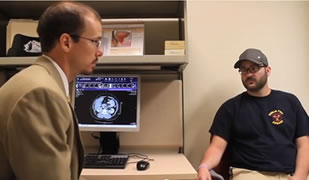Shared Content Block:
Surgery Styles -- prevent images from going 100% wide on mobile
Testicular Cancer

Urologist Paul Maroni, MD, consults with a patient.
Testicular cancer is a malignancy of the testicle. It is the most common type of cancer in men from 15 to 40 years of age, but it can occur at any age from infancy through adulthood.
There are several types of testicular tumors and tumors that surround the testicle, but by far the most common (90-95% of cases) is a specific type of cancer called a Germ Cell Tumor (GCT). The information below will focus on testicular tumors of this type. We do manage the other types of tumors (for example, testicular stromal tumors and para-testicular rhabdomyosarcomas) and may treat them with similar surgeries and chemotherapy, but they each require specific treatment plans. We would be happy for you to contact us and set up an appointment to discuss these in person (phone 720-848-0206).
Germ Cell Tumors are typically detected as a mass felt by the patient or doctor. Sometimes the mass causes pain or discomfort, sometimes not. Any lump, swelling, or unusual sensation in the testicle should lead to an exam by a physician and potentially an ultrasound of the scrotum and testicles. At this point, if a mass or tumor is detected in the testicle, it requires evaluation by a urologist (a physician who specializes in the surgical and medical management of the genitals, prostate, bladder, and kidneys).
Most patients with a testicular mass or tumor will be advised to undergo surgical removal of the testicle (orchiectomy). This will allow the pathologists to look under the microscope and determine what type of tumor it is and help guide what further treatment is required. Additionally, some radiologic imaging (X-rays and CT Scans) and blood tests (tumor markers such as Alpha-Fetoprotein and Beta-HCG) will be required to evaluate the tumor and determine the likelihood that the cancer has spread to other parts of the body.
The good news is that testicular cancer is treatable and has a favorable outlook; most patients are cured. However, at a minimum, this will require close follow-up with your urologist and possibly an oncologist (a physician specialized in cancer). It may also include further surgery, chemotherapy, radiation, and routine imaging to see if the cancer has spread or returned.
- If X-rays or CT scans show that your tumor has spread, depending on how much tumor has spread, you will likely require chemotherapy or surgery—possibly both. These treatment decisions will depend on many factors and will be a personal decision after discussion with your physicians.
- If the cancer does not appear to have spread, there are options that range from frequent follow-up to make sure it does not return to further surgery to treat the potential that the tumor has spread. The correct treatment for you depends on the type of tumor you have and a personal discussion between you and your physicians.
We are experienced with all phases of treatment for testicular cancer and can provide care for patients with all stages of disease. The proper treatment for this type of cancer is not always straightforward, and we believe it helps to get some advice from physicians with abundant experience treating this cancer. It would be our pleasure to meet with you to discuss your specific situation. We offer both traditional and cutting-edge options for treatment, as well as the opportunity to be involved with the latest in research for testicular cancer.
Please call us at 720-848-0206 with any questions or concerns.